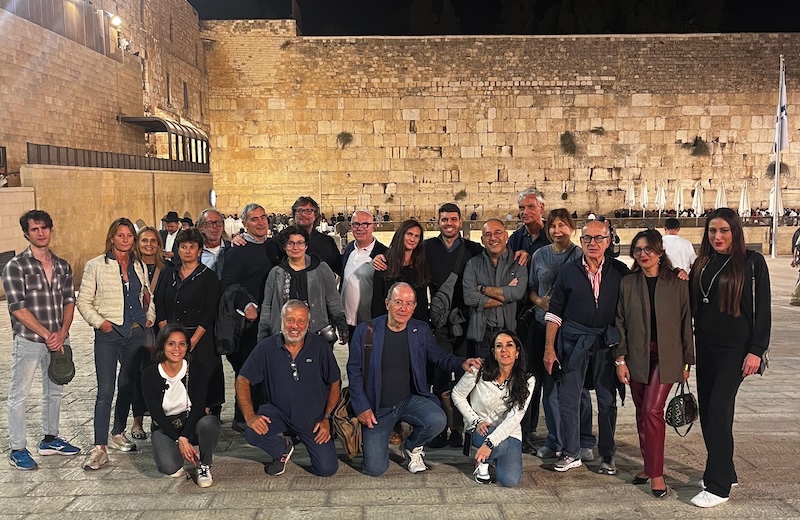LAWYERS IN ISRAEL – A journey through memory, law, and reality after October 7

A delegation of Italian jurists — lawyers, university professors, and members of organizations and associations such as UCEI, AGE, ALA, and the Union of Italy-Israel Associations — has recently concluded an almost week-long trip to Israel. The aim of the visit was to observe, document, and understand the Israeli reality after the tragic October 7, 2023, pogrom. The Israeli Embassy in Italy organized the mission in collaboration with the Legal Affairs Department of the Israeli Ministry of Foreign Affairs. It combined field visits, institutional meetings, and discussions with representatives of social communities. This offered participants a direct view of the situation in the affected areas and the response of the state and local communities.
The delegation first stopped in the Gaza Envelope, where Hamas’s violence had tragically struck at the Nova Festival and in the kibbutzim of Nir Oz and Kfar Aza. In these places of celebration and daily life hundreds of young people were killed and many families were decimated or kidnapped during the attack. There, the delegation heard harrowing testimonies from survivors.
The field visits brought the horror of that day to life: damaged and burned houses empty of people but still full of everyday objects; memorials bearing the smiling faces of the victims; and places of remembrance recounting pain, resilience, and collective memory.
Of the places visited, the area near the Re’im kibbutz was particularly striking. The unbridled joy of a youth music festival there quickly turned into a scene of prolonged and indiscriminate violence.
Institutional meetings: rights and responsibilities
In addition to the field visits, the delegation participated in a series of meetings at the Israeli Ministry of Foreign Affairs and the Ministry of Justice. During the meetings, the delegation discussed the phenomenon of antisemitism in universities and on social media with experts, as well as strategies for protecting fundamental rights. These meetings addressed important topics such as the legal recognition of micro-discrimination, the protection of minorities, combating academic and cultural boycotts, and establishing shared international definitions of antisemitism.
Responsibility was a recurring theme, ranging from the IDF’s compliance with war law laws of war to the documentation of Hamas’ violations, including the critical management of information disseminated by international organizations. The visit to the Supreme Court and the meeting with the Russian-born judge were particularly interesting. One judge answered numerous questions and offered a broad overview of the Israeli legal system’s characteristics. This system develops democratic principles and guarantees fundamental rights despite being without a constitution and recently being subject to reform proposals.
Insights into security and minorities
The trip included meetings with Israeli security forces, the Coordinator of Government Activities in the Territories (COGAT), and the Dinah Project. The Dinah Project is a group of women experts in law, gender equality, and civil society. By combining multidisciplinary knowledge and skills with a deep commitment, the group has become the main resource for recognizing and bringing justice to victims of October 7 and future victims of conflict-related sexual violence.
These meetings offered insight into the complexities of international humanitarian law as applied in conflict situations, the role of institutions and independent organizations in protecting civilians, and the challenges of ensuring justice and security in dangerous contexts.
A visit to the northern border with Lebanon provided an opportunity to meet with Druze community representatives and observe minority-state relations. The Druze’s full integration into Israeli society is evidenced by their military service and commitment to the peaceful coexistence of all communities within the territory.
Significance and impact of the mission
The Israeli experience offered the Italian delegation a unique opportunity to confront the realities of contemporary conflicts, the limitations and responsibilities of international law, and survivor testimonies. Through a combination of field visits and institutional meetings, the group was able to understand the inseparable connection between memory, testimony, and legal protection.
For the group of Italian lawyers, the trip was an opportunity to reflect on how their profession could contribute to conflict understanding, rights protection, and public awareness. Upon returning to Italy, the delegation will bring back not only data and analysis but also lived experiences and stories of resilience that provide an immediate, concrete, and humanly engaging understanding of the Israeli reality.
Davide Jona Falco
